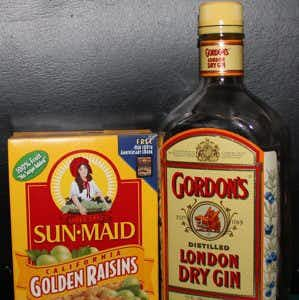
We first heard about the gin and raisin remedy for arthritis nearly 30 years ago. On May 16, 1994 we received this letter:
“A neighbor gave my wife a recipe for “arthritis relief” that involves soaking golden raisins in gin. When the gin has completely evaporated she is to eat nine raisins a day.
She’s just starting to eat these raisins, so we don’t know yet whether it will make any difference. Our neighbor says it has helped his shoulder pain. What do you think?”
At the time, we thought this was one of the most original home remedy for aches and pains that we had ever received. We speculated that it might be the juniper flavoring in the gin, even though the amount is small. Maybe the golden raisins had something special in them. There was certainly nothing in the medical literature to support this concoction.
Gin and Raisin Remedy Nearly 3 Decades Later
Long after that first message we have heard from hundreds, if not thousands, of readers that the gin and raisin remedy is helpful for many. Not everyone benefits, but a surprising number of people seem to get relief. Here is just the most recent message:
Q. I stopped taking glucosamine in favor of gin-soaked raisins with terrific results. I’m a former runner with serious but not debilitating knee and hip pain. When I read about gin-soaked raisins I thought it sounded silly.
I gave it a try anyway. It worked. I haven’t used the pills now for over eight months.
I’m curious: why golden raisins? Sometimes golden raisins are not readily available. Will plain old black raisins work just as well? I like to know why something works.
Are Grapes the Magic Ingredient?
A. We’ve been searching for research on gin-soaked raisins for joint pain for years. Sadly, home remedies are rarely studied in randomized controlled trials. As a result, we don’t have a good answer to your question.
There are data to suggest that grape juice may have a number of health benefits. They include enhanced performance and reduced inflammation in runners (Applied Physiology, Nutrition, and Metabolism, Sept. 2015). Grape juice also appears to make blood vessels more flexible and improve cognitive performance (Nutrients, Dec. 2, 2015; American Journal of Clinical Nutrition, March, 2016). Since raisins are dried grapes, this might help to explain why so many people find the raisin remedy helpful.
A study in rats showed that the compounds in grape seed help protect against joint damage (Experimental & Molecular Medicine, Oct. , 2011).
If you decide to do your own experiment to see if dark raisins work as well as golden ones, please let us know the results.
Other Stories from Readers:
Dion in New Zealand shared this success:
“I am 69 years old and have been getting leg pain for the past three or four years, especially when I try getting up from sitting for a while. I was putting this down to my daily workouts at the gym. Then I went on holiday for three weeks, and the pain only got worse. I was having trouble walking and getting bad cramps at night so the idea of the pain being related to gym exercise was false.
“Then I read about the gin and raisin remedy and have been trying that for about two months. WOW! What a change.
“I’m not getting any pain in my legs now and look forward to taking our dog for a walk up to three times a day. I soak the raisins in gin for about a week prior to taking them. I always have two containers on the go: one soaking while I use the other one.
“I have not noticed any difference between using white (golden) or black raisins and have used both as a trial. Give it a try. You have nothing to lose.”
Sophia got a surprising bonus from the gin and raisin remedy:
“I tried gin-soaked raisins for osteoarthritis, not expecting much, if anything. To my great surprise, my knee which had been badly swollen for several years, became almost normal sized within a few days.
“An even greater surprise was my breast, which had been greatly swollen from radiation damage a year ago, was reduced to normal. I didn’t know that gin-soaked raisins could reduce inflammation!
“When I stopped eating them, the inflammation returned. I bought another brand of gin but it didn’t work as before. My son did some research, and found that the gin should contain wild juniper. Check the label for that ingredient.
“Now I’m back on track, and am grateful to you for the surprising remedy. And the 4 pound weight loss was welcome!”
We’re surprised that this remedy could have resulted in any weight loss. Raisins plus gin turn into a sweet, syrupy mixture after a week or two. We’re also pleased to learn that the anti-inflammatory effect goes beyond sore joints.
If you would like to see how to make the gin and raisin remedy, here is a short video:
Share Your Own Gin and Raisin Story:
If you have tried this remedy, please let us know how well it worked (or didn’t) in the comment section below. If you would like to learn more about the details of the gin and raisin remedy you will find that our booklet, Graedons’ Guide to Alternatives for Arthritis. It has answers to FAQs such as:
How long does it take for the gin to evaporate?
Once the raisins are ready, should they be refrigerated?
How much alcohol is in the raisins?
Does it matter what type of gin?
Can you use dark raisins?
Are there any side effects?
Will I flunk a Breathalyzer test after eating the raisins?
Answers to these question can be found in our book along with other non-drug options for dealing with arthritis and inflammation. You will also find intriguing options for joint pain in our book, The People’s Pharmacy Quick & Handy Home Remedies.

